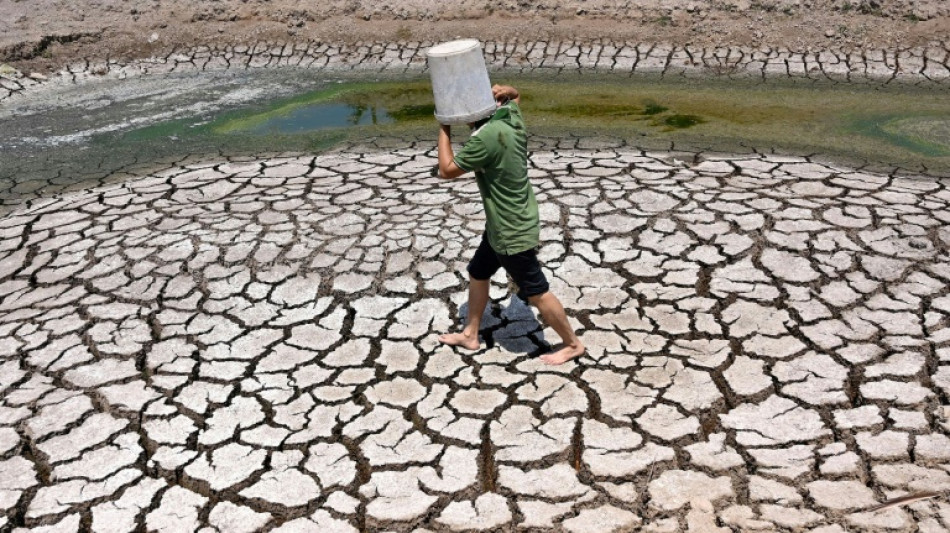
-
 EU warns Meta it must open up WhatsApp to rival AI chatbots
EU warns Meta it must open up WhatsApp to rival AI chatbots
-
Scotland spoil Italy's T20 World Cup debut with big win

-
 Israeli president says 'we will overcome evil' at Bondi Beach
Israeli president says 'we will overcome evil' at Bondi Beach
-
Munsey leads Scotland to 207-4 against Italy at T20 World Cup

-
 Japan restarts world's biggest nuclear plant again
Japan restarts world's biggest nuclear plant again
-
Bangladesh poll rivals rally on final day of campaign

-
 Third impeachment case filed against Philippine VP Duterte
Third impeachment case filed against Philippine VP Duterte
-
Wallaby winger Nawaqanitawase heads to Japan

-
 Thailand's Anutin rides wave of nationalism to election victory
Thailand's Anutin rides wave of nationalism to election victory
-
Venezuela's Machado says ally kidnapped by armed men after his release

-
 Maye longs for do-over as record Super Bowl bid ends in misery
Maye longs for do-over as record Super Bowl bid ends in misery
-
Seahawks' Walker rushes to Super Bowl MVP honors

-
 Darnold basks in 'special journey' to Super Bowl glory
Darnold basks in 'special journey' to Super Bowl glory
-
Japan's Takaichi may struggle to soothe voters and markets

-
 Seahawks soar to Super Bowl win over Patriots
Seahawks soar to Super Bowl win over Patriots
-
'Want to go home': Indonesian crew abandoned off Africa demand wages

-
 Asian stocks track Wall St rally as Tokyo hits record on Takaichi win
Asian stocks track Wall St rally as Tokyo hits record on Takaichi win
-
Bad Bunny celebrates Puerto Rico in joyous Super Bowl halftime show

-
 Three prominent opposition figures released in Venezuela
Three prominent opposition figures released in Venezuela
-
Israeli president says 'we shall overcome this evil' at Bondi Beach

-
 'Flood' of disinformation ahead of Bangladesh election
'Flood' of disinformation ahead of Bangladesh election
-
Arguments to begin in key US social media addiction trial

-
 Dr. Jonathan Spages Expands Diabetes Reversal Practice Across New States, Adds Clinical Team to Meet Growing Demand
Dr. Jonathan Spages Expands Diabetes Reversal Practice Across New States, Adds Clinical Team to Meet Growing Demand
-
Agronomics Limited Announces Net Asset Value Calculation as at 31 December 2025

-
 UK-Based Vesalic Limited Emerges from Stealth with Landmark Discovery of Potential Non-CNS Driver of Motor Neuron Diseases, including ALS, and Breakthrough Therapeutic and Diagnostic Opportunities
UK-Based Vesalic Limited Emerges from Stealth with Landmark Discovery of Potential Non-CNS Driver of Motor Neuron Diseases, including ALS, and Breakthrough Therapeutic and Diagnostic Opportunities
-
Gotterup tops Matsuyama in playoff to win Phoenix Open

-
 New Zealand's Christchurch mosque killer appeals conviction
New Zealand's Christchurch mosque killer appeals conviction
-
Leonard's 41 leads Clippers over T-Wolves, Knicks cruise

-
 Trump says China's Xi to visit US 'toward the end of the year'
Trump says China's Xi to visit US 'toward the end of the year'
-
Real Madrid edge Valencia to stay on Barca's tail, Atletico slump

-
 Malinin keeps USA golden in Olympic figure skating team event
Malinin keeps USA golden in Olympic figure skating team event
-
Lebanon building collapse toll rises to 9: civil defence

-
 Real Madrid keep pressure on Barca with tight win at Valencia
Real Madrid keep pressure on Barca with tight win at Valencia
-
PSG trounce Marseille to move back top of Ligue 1

-
 Hong Kong to sentence media mogul Jimmy Lai in national security trial
Hong Kong to sentence media mogul Jimmy Lai in national security trial
-
Lillard will try to match record with third NBA 3-Point title

-
 Vonn breaks leg as crashes out in brutal end to Olympic dream
Vonn breaks leg as crashes out in brutal end to Olympic dream
-
Malinin enters the fray as Japan lead USA in Olympics team skating

-
 Thailand's Anutin readies for coalition talks after election win
Thailand's Anutin readies for coalition talks after election win
-
Fans arrive for Patriots-Seahawks Super Bowl as politics swirl

-
 'Send Help' repeats as N.America box office champ
'Send Help' repeats as N.America box office champ
-
Japan close gap on USA in Winter Olympics team skating event

-
 Liverpool improvement not reflected in results, says Slot
Liverpool improvement not reflected in results, says Slot
-
Japan PM Takaichi basks in election triumph

-
 Machado's close ally released in Venezuela
Machado's close ally released in Venezuela
-
Dimarco helps Inter to eight-point lead in Serie A

-
 Man City 'needed' to beat Liverpool to keep title race alive: Silva
Man City 'needed' to beat Liverpool to keep title race alive: Silva
-
Czech snowboarder Maderova lands shock Olympic parallel giant slalom win

-
 Man City fight back to end Anfield hoodoo and reel in Arsenal
Man City fight back to end Anfield hoodoo and reel in Arsenal
-
Diaz treble helps Bayern crush Hoffenheim and go six clear


March saw 10th straight month of record global heat: monitor
Europe's climate monitor said Tuesday that March was the hottest on record and the tenth straight month of historic heat, with sea surface temperatures also hitting a "shocking" new high.
It is the latest red flag in a year already marked by climate extremes and rising greenhouse gas emissions, spurring fresh calls for more rapid action to limit global warming.
- Rolling records -
Every month since June 2023 has beaten its own "hottest ever" tag -- and March 2024 was no exception.
The EU's Copernicus Climate Change Service (C3S) said that March globally was 1.68 degrees Celsius hotter than an average March between the years 1850-1900, the reference period for the pre-industrial era.
The March record was only broken by 0.1C but it is the broader trend that was more alarming, said Samantha Burgess, deputy director of C3S.
Huge swathes of the planet endured above-average temperatures in March, from parts of Africa to Greenland, South America and Antarctica.
- 'Borrowed time' -
It was not only the tenth consecutive month to break its own heat record, but capped the hottest 12-month period on the books -- 1.58C above pre-industrial averages.
This doesn't mean the 1.5C warming limit agreed by world leaders in Paris in 2015 has been breached -- that is measured in decades, not individual years.
Nonetheless "the reality is that we're extraordinarily close, and already on borrowed time," Burgess told AFP.
The UN's IPCC climate panel has warned that the world will likely crash through 1.5C in the early 2030s.
- 'Incredibly unusual' -
The story at sea was no less "shocking", Burgess said, with a new record for global ocean surface temperature set in February eclipsed once again in March.
"That's incredibly unusual," she said.
Oceans cover 70 percent of the planet and have kept the Earth's surface liveable by absorbing 90 percent of the excess heat produced by the carbon pollution from human activity since the dawn of the industrial age.
- More heat, more rain -
Hotter oceans mean more moisture in the atmosphere -- scientists say the air can generally hold around seven percent more water vapour for every 1C of temperature rise.
This leads to increasingly erratic weather, like fierce winds and powerful rain.
Russia is reeling from some of its worst flooding in decades while parts of Australia, Brazil and France experienced an exceptionally wet March.
"We know the warmer our global atmosphere is, the more extreme events we'll have, the worse they will be, the more intense they will be," Burgess told AFP.
- Heat on the horizon -
Copernicus said the cyclical El Nino climate pattern, which warms the sea surface in the Pacific Ocean, leading to hotter weather globally, continued to weaken in March.
But its "warming effect" alone did not explain the dramatic spikes witnessed this past year and projections for the coming months still indicated above-average temperatures, Burgess said.
Could this mean more records shattered this year?
"Whilst we continue to see so much heat in the surface ocean -- so in the sea surface temperatures -- I think it's highly likely," Burgess said.
- Bigger question -
Copernicus records go back to 1940 but other sources of climate data such as ice cores, tree rings and coral skeletons allow scientists to expand their conclusions using evidence from much deeper in the past.
"We know that the period that we're living in right now is likely to be the warmest that it's been for the last 100,000 years," Burgess said.
As climate records tumble, scientists are debating whether the extreme heat seen this past year was within the bounds of what was forecast -- or was something more uncharted.
"Is it a phase change? Is the climate system broken? We don't really understand yet why we have this additional heat in 23/24. We can explain most of it, but not all of it," Burgess said.
What had transpired was "within the envelope" of scientific forecasts "but it was the very outer edge of the envelope, rather than the mean or the median where you'd expect it to fall", she added.
- Up and up -
Humanity, meanwhile, continues to pump ever-more planet-heating emissions into the atmosphere even as scientists say they need to fall by almost half this decade to keep the Paris goals within reach.
Levels of carbon dioxide, methane, and nitrous oxide -- the three main human-caused greenhouse gases -- rose for another year in 2023, scientists from the US-based National Oceanic and Atmospheric Administration said on Friday.
"Until we get to net zero, we will continue to see temperatures rise," Burgess said.
J.Oliveira--AMWN


